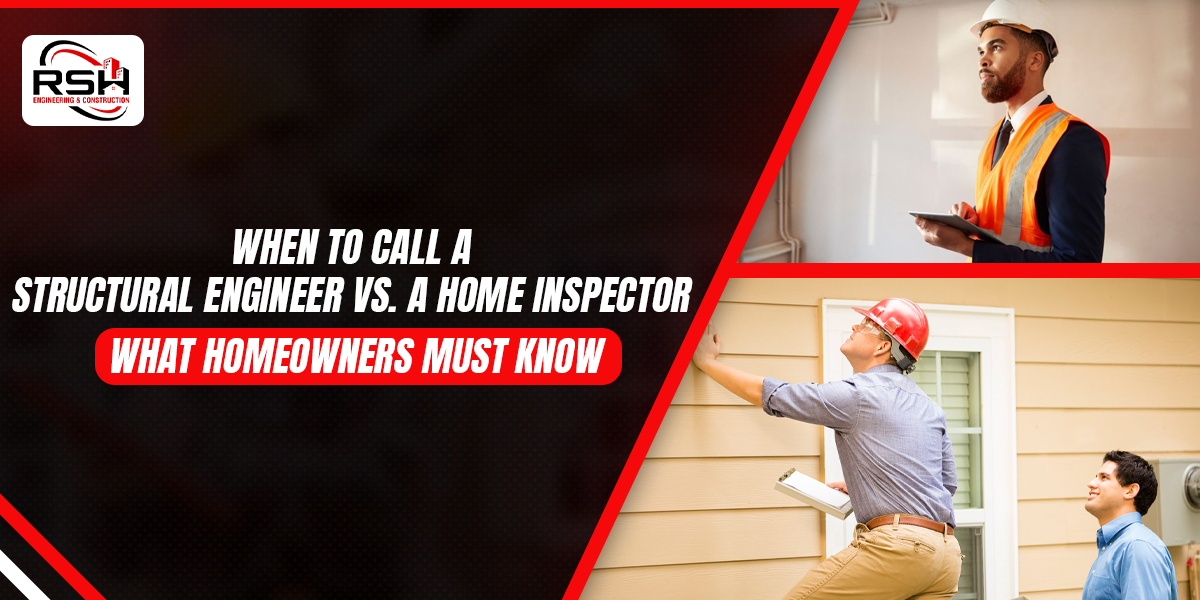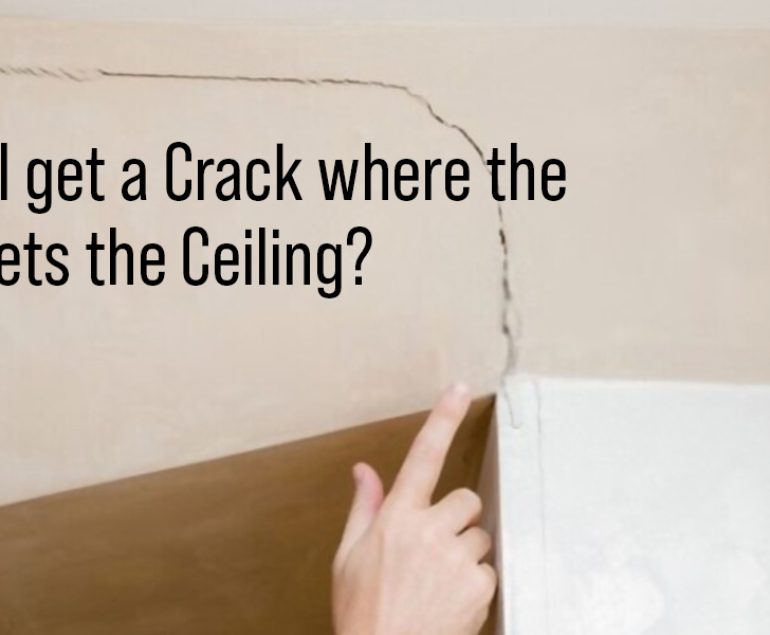Homeownership comes with both pride and responsibility. When cracks appear on walls, floors start to slope, or you plan a major remodel, you might wonder: should I call a structural engineer or a home inspector? At RSH Engineering & Construction, we guide homeowners through these censorious decisions every day.
Well! Understanding the difference between the two professionals can save you stress, time, and expensive mistakes.
The Role of a Home Inspector
A home inspector is usually your first stop when buying or selling a property. Their job is to evaluate the visible and accessible systems of a home from the roof to the foundation, plumbing, and electrical panels.
Home inspection services include:
- Visual examination of structural elements like walls, ceilings, and floors
- Assessment of electrical, HVAC, and plumbing systems
- Checking for safety hazards or maintenance issues
A local home inspector helps you identify problems that could affect your purchase or future maintenance. However, deeper concerns such as foundation cracks or sagging beams may arise. You will need to consult more specialized experts.
When to Call a Structural Engineer
A structural engineer focuses on the strength and stability of your building. If you are facing complex structural issues, the right move is to hire a structural engineer for foundation issues or load-bearing evaluations.
You should call a structural engineer when:
- You notice signs of foundation movement, like diagonal cracks or sticking doors
- Major renovations or additions are planned that could change your home’s structure
- A home inspector recommends further evaluation of a potential defect
At RSH Engineering & Construction, our certified structural engineers don’t just identify the problem; they provide solutions, detailed reports, and repair designs that contractors can follow accurately.
Key Differences Between a Structural Engineer and a Home Inspector
While both play important roles, their focus areas and qualifications differ. Understanding this difference helps homeowners act confidently.
| Aspect | Home Inspector | Structural Engineer |
| Primary Focus | General condition of the home | Load-bearing structure and design |
| Education | Certification in home inspection | Licensed engineering degree |
| Reports | Summary of visible issues | Calculations and detailed repair recommendations |
| When to Call | During property purchase or regular maintenance | For visible damage or structural modifications |
A useful rule of thumb: a home inspector tells you what is wrong, while a structural engineer tells you why it’s wrong and how to fix it.
Understanding Structural Inspections
A structural inspection goes beyond a routine visual check. It involves analyzing how the building handles loads, soil movements, and weather effects over time.
During a structural evaluation, an engineer may:
- Examine the foundation, beams, and framing
- Use tools like laser levels or crack monitors to measure movement
- Assess repair history and suggest corrective steps
These assessments are important when buying an older home, adding extra stories, or noticing signs of foundation damage such as uneven floors or widening cracks.
Professional Engineer Inspections—The Next Level of Confidence
A professional engineer inspection gives homeowners and real estate buyers added peace. A licensed structural engineer stamps and signs this evaluation, providing a higher level of technical validation.
We at RSH Engineering & Construction systematically design our professional engineer inspection reports for clarity and credibility. You can also use them for insurance claims, permit approvals, or mortgage applications.
If you are already working with a home inspector, both professionals can coordinate so findings from one complement the other, giving you a full picture of your home’s health.
Recognizing Foundation Damage Signs
Detecting foundation damage issues early prevents larger repairs later. Some common indicators that you might need an engineer for foundation issues:
- Cracks appearing wider at the top than the bottom
- Uneven or sloping floors
- Doors and windows that jam or won’t close
- Gaps between walls and ceilings
- Separation in brickwork or exterior siding
When these issues surface, it’s time to move beyond simple observation and seek professional insight.
The Advantage of Choosing RSH Engineering & Construction
Choosing RSH Engineering & Construction means partnering with a company that values accuracy, transparency, and long-term solutions. Our structural engineers and home inspectors work hand-in-hand to provide complete diagnostics for homeowners, realtors, and builders.
Why do clients choose us?
- Licensed professionals with decades of experience in evaluation
- Home inspection services backed by engineering experts
- Detailed reports with practical repair recommendations
- Personal consultation to help you decide between an inspection or a full structural engineer review
Our commitment is simple: to protect your home’s structural safety and your peace.
When to Call a Structural Engineer vs. a Home Inspector—Quick Guide
A quick reference for homeowners:
Call a Home Inspector When:
- Buying or selling a property
- You need a general condition report
- You suspect minor maintenance issues
Call a Structural Engineer When:
- You see visible signs or damage to the foundation.
- You plan remodeling that affects load-bearing walls
- You need a certified structural evaluation or professional engineer inspection
Knowing which expert to contact helps you save money and avoid repeated assessments.
Conclusion
Your home deserves the best care, and choosing between a structural engineer vs. a home inspector doesn’t have to be confusing. With RSH Engineering & Construction, you get guidance, accurate assessments, and honest recommendations from licensed experts.
If you notice structural concerns or need a trustworthy inspection, contact RSH Engineering & Construction today to schedule your evaluation and protect your home’s foundation with care.
Frequently Asked Questions About When to Call a Structural Engineer vs. a Home Inspector:
Q1: How do I know if I need a structural engineer or a home inspector?
A1: Start with a home inspection service if you are buying or selling a house. If the report flags structural problems, call a structural engineer for deeper analysis and repair plans.
Q2: What is the cost difference between a home inspector and a structural engineer?
A2: A home inspector typically costs less because their scope is visual, while a structural engineer provides a more technical assessment involving calculations, testing, and certified documentation.
Q3: Can a home inspector identify foundation issues?
A3: A home inspector can recognize surface signs, but only a structural engineer for foundation problems can determine the severity, cause, and best repair approach.





